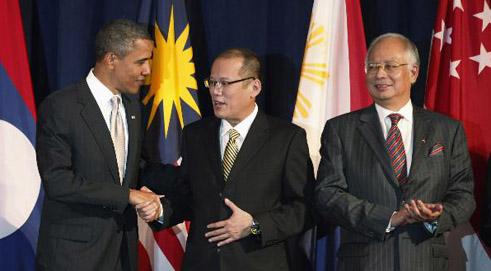
U.S. President Barack Obama (L) shakes hands with Philippines President Benigno Aquino III (C) alongside Malaysian Prime Minister Najib Razak during a group picture at a meeting between President Obama and ASEAN leaders on the sidelines of the United Nations general assembly in New York, September 24, 2010. (Xinhua/Reuters Photo)
NEW YORK, Sept. 24 (Xinhua) -- Leaders of the United States and the Association of Southeast Asian Nations (ASEAN) met here Friday in a bid to deepen their ties. However, experts believe symbolism outweighed substance at the meeting.
In his opening speech at the meeting, U.S. President Barack Obama vowed to deepen U.S.-ASEAN relations, saying his country had an enormous stake in the region.
The two sides agreed to further deepen the current partnership, according to a joint statement afterwards.
The 25-point statement covers a wide range of issues, including climate change, economics, and non-proliferation.
U.S. RE-ENGAGEMENT
Analysts say the former Bush administration seemed to be ignorant of ASEAN, the regional bloc grouping 10 Southeast Asian states, evidenced by the absence of then Secretary of State Condoleezza Rice at two important ASEAN meetings.
Since he took office, Obama announced his new diplomatic priorities, including improving relations with the Muslim world, a back-to-Asia strategy and an emphasis multilateral diplomacy.
However, these goals can not be realized without engaging ASEAN, which has become an increasingly significant regional organization. In addition, there is a huge Muslim population within the bloc. Indonesia has the biggest Muslim population in the world.
Last year, Obama met all 10 ASEAN leaders for the first time in Singapore, the first U.S. president to do so. Besides Friday's meeting, he has confirmed that he will attend the East Asia summit next year in Jakarta, Indonesia.
Judging from these moves, Obama has a strong motivation to get involved in Southeast Asian affairs.
"The Bush administration got diverted by the war on terror and the wars in Iraq and Afghanistan. Now Obama is trying to resume the U.S.'s past activism (in Asia) and restore the previous level of involvement in Southeast Asia," Douglas Paal, vice president of research at the Carnegie Endowment for International Peace, told Xinhua.
Simon Tay, research fellow with Asia Society in New York, told Xinhua: "I think the Obama administration has come to realize, in the relationship with Asia, ASEAN has played an important role, as a hub for many of the Asian meetings, so it is important to engage ASEAN."
A SYMBOLIC MEETING
Despite the clear intention of substantive engagement, the content of the joint statement is more about good-will commitment and general principles and lacks real substance.
"Similar to the meeting in Singapore, the result is largely symbolic," said Tay, who is also chairman of the Singapore Institute of International Affairs.
"There has been some preparation, but not a lot of substantive movement since the first summit. It is notable that the Indonesian president did not attend the summit. This suggests that even though ASEAN wants to engage the U.S., they have their own concerns. This relationship needs to grow substantively," he said.
BARRIERS UNDER SURFACE
Tay also said substantive cooperation between the United States and ASEAN faced barriers, citing a free trade agenda as one example which would be opposed by U.S. domestic politics.
ASEAN expert with the Center for Strategic and International Studies Ernest Bower said: "The fact that the summit is taking place in New York, not Washington, and without the leader of ASEAN's largest country and economy, Indonesia, underlines the fact that there is still much work to be done to align the United States and ASEAN."
"Insiders confirm that Yudhoyono decided he could not come to New York because of a confluence of issues, including the fact that Obama has had to postpone planned travel to Indonesia three times since taking office and the short notice given by the White House (not quite a month in advance of the meeting)," he said.
Source: Xinhua
Related News
Photos
More>>trade
market
- China, Russia Look to "New Era" of Strategic Relations
- China's Political Advisors to Meet for Discussion of Next Five-year Plan
- Senior Chinese Leader Urges Breakthroughs in Xinjiang's Development
- Senior CPC Official Meets with Estonian Leaders on Bilateral Relations
- Visiting Chinese Envoy Meets Palestinian President Over Peace Talks





